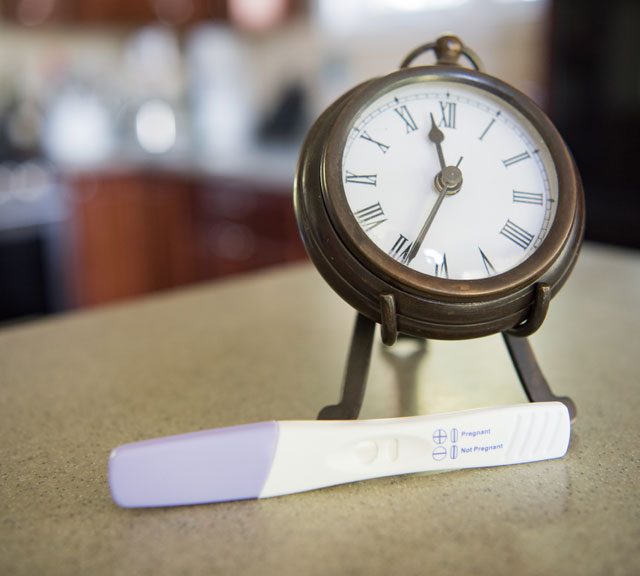Is It Time Yet? When to See a Fertility Specialist

Answer a few questions and we'll provide you with a list of primary care providers that best fit your needs.
If you and your partner are having trouble getting pregnant, an obstetrician or fertility specialist may be able to help.
Specialists evaluate the key elements that can cause infertility including your reproductive organs, your age, lifestyle and risk factors.
“The best time to see a specialist varies with your age, risk factors and how long you’ve been trying to get pregnant without success,” says Jeremy Groll, MD, SpringCreek Fertility.
In general, you can use these guidelines to know when to make an appointment:
“Knowledge is power,” says Dr. Groll. “Patients need to understand the process and have clear expectations.”
- You’re less than 35 and you’ve been trying to get pregnant for a year
- You’re between 36 and 40 and trying to get pregnant for six months
- You’re older than 40 and trying to get pregnant for three months
Many issues can contribute to a delay in conception. Unfortunately, age is not our friend, and it is a big contributor to a couple’s ability to get and stay pregnant. A woman’s fertility begins to decline after age 32, with steep declines beginning at 35. The chance of miscarriage also increases with age. This happens because of genetic, chromosomal, and metabolic changes that take place inside a woman’s eggs as she gets older. A man’s age can also impact fertility. Changes in the sperm quality and a reduction in the sperm count happen as a man ages.
A man’s age can also impact fertility. Changes in the sperm quality and a reduction in the sperm count happen as a man ages.
You should also see a specialist if you’ve had more than one miscarriage.
If you’re unsure about seeing a specialist, talk to your gynecologist or primary care doctor about your concerns. Many medical conditions and risk factors may be impacting your fertility.
Know Your Risk Factors
If you or your partner carries obvious risk factors known to affect fertility, you should seek medical intervention earlier than the general age guidelines, says Dr. Groll.
For women, risks include:
- Irregular menstrual cycles
- Painful periods
- Irregular ovulation
- Previous pelvic surgery
- Pelvic infections
- Endometriosis (may affect ovulation or egg implantation)
- Uterine fibroids
- Previous chemotherapy
- Previous miscarriage
- History of sexually transmitted disease
There are also risks for men, such as:
- Previous inguinal surgery
- Medicines for baldness (some, like Propecia, impact sperm function)
- Varicocele (abnormality of veins in the testicle affects sperm quality)
- Previous chemotherapy
- History of sexually transmitted disease
Your lifestyle can lead to risk factors that affect egg quality or sperm function. They are:
- Smoking cigarettes
- Exposure to secondary smoke
- Smoking pot
- A BMI over 30
In many cases, you may be able to reverse lifestyle infertility issues by changing your behaviors or losing weight.
“The bottom line is there are risk factors you can influence to help you get and stay pregnant,” says Dr. Groll..
How a Specialist Can Help
Before you meet with the fertility specialist, fill out all pre-appointment forms. Bring any relevant health records with you to your appointment.
“We recognize it is difficult, but being open about your situation and your health history will help your provider create the best treatment plan for you,” says Dr. Groll.
It can be helpful to educate yourself about infertility in general before the appointment. Do some research so that you are familiar with the infertility lingo and so that you can confidently ask questions.
You also may be asked to complete an infertility questionnaire, which helps guide the doctor toward potential infertility issues for you or your partner.
The doctor will assess the health and status of:
- Egg quality
- Sperm quality
- Fallopian tubes (where fertilization occurs)
- Uterus (where a pregnancy will occur)
- Cervix (which could be a bad environment for sperm)
The doctor will use medical tests to help pinpoint the reason for infertility. Tests may include:
- Blood work
- Semen analysis
- Imaging of the cervix, fallopian tubes, ovaries and uterus
“I talk with couples about physiology and how the body works so that they understand the process,” says Dr. Groll. “Then we get the test results and we talk about it.”
Fertility Treatments
When you work with a fertility specialist, the path toward pregnancy depends on the specific reasons for your infertility and the treatment plan you choose. Treatment may focus on the woman’s infertility, the man’s infertility or both.

“In general, normal fertility rates mean that roughly two in 10 people get pregnant every month,” says Dr. Groll, “or about 80 percent of people trying to get pregnant will become pregnant in a year.”
“That’s the benchmark,” says Dr. Groll. “I try to get a couple to normal fertility and I can work to accelerate that.”
When you begin fertility treatments, it helps to have realistic expectations. “Knowledge is power,” says Dr. Groll. “Patients need to understand the process and have clear expectations.”
Fertility treatments are a partnership between patients and their doctor. You should educate yourself and your partner and be your own advocate. “I work with patients to develop a treatment plan that they are comfortable with and that helps them pursue their family plans,” says Dr. Groll. “They help me make the decision as to what they want to do.”
Many treatments are available. No matter which route you choose, your doctor and other health providers, such as a social worker and nutritionist, will be available to provide support and answer your questions.
Answer a few questions and we'll provide you with a list of primary care providers that best fit your needs.
Source: Jeremy Groll, MD, SpringCreek Fertility; Wright State Physicians Obstetrics & Gynecology; Brigham and Women’s Hospital; American Society for Reproductive Medicine; Resolve, the National Infertility Association





